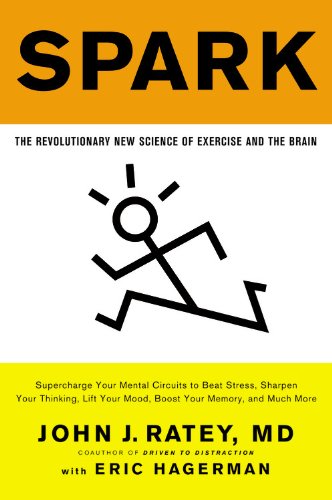Twice a year, all of our staff get together to read and dissect a book; these are usually not directly related to fitness, but instead subjects that will get us thinking. At the end of the day, though, we DO become better trainers and coaches because the topics help us improve our skills as: goal managers, psychologists, motivators, and health promotors. Last month we discussed the book, “SPARK: the Revolutionary New Science of Exercise and the Brain,” by Dr. John J. Ratey and Eric Hagerman.

Generally speaking, Dr. Ratey discusses the connection between physical activity and cognition. While very science forward, this is an approachable book that should be required reading for anyone who wants to think and reason clearly, and stave off the mental decay brought on by aging, mental disorders, and inactivity.
The biggest take-aways:
1 – All stress is not bad. Proper stress – even at the cellular level – is actually beneficial. It is what helps to stimulate the body. Judicious and properly applied stressor will make us healthier and more able to handle dangerous and debilitating circumstances in our futures. Miniscule amounts of toxins in the foods we eat actually make us more capable of fending off disease.
2 – Age is not a deterrent. We can improve at the cellular level and increase brain size at any age. Aging really at its most basic view is the body’s cessation of regeneration and growth. By exercising, we are not only improving our muscular and cardiovascular systems, but increasing neural connections and positive hormonal and neurotransmitter levels in our brains.
3 – The same general principles apply to most of everything we do and how we can change, correct, or influence our circumstance and environment to improve our lives. Whether it’s dementia, anxiety, depression, or addiction, exercise, both physical and mental, can help ameliorate and control these problems.
4 – Inactivity is the ultimate killer. Lack of physical activity will rot not only our bodies, but also our brains and cognitive abilities. Just like slowing aging, physical activity helps to (re)build pathways in our brains that make us more productive and improve focus and attention.
5 – Exercise is a great way to bolster our mental faculties, regardless of the task at hand. The hormonal and neurotransmitter cascades that occur after exercise help to “grow” our brains and leave them in an environment more capable of learning and retaining information.
Now before you get intimidated by thinking that this means that you have to go out and train for a marathon or throw 1,000 pounds over your head, know this: a little is better than nothing, and every little bit more is beneficial. Taking your current state, adding just 30 minutes of brisk walking daily is enough exercise to make improvements – in your physical health, but also in your thinking and mood. Try a new sport, add an after-dinner walk with your spouse, or come in for an additional 30 minute session each week. These will all help you on your path to improving your life and vitality.

